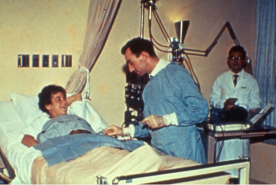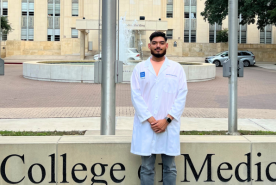What is a simultaneous kidney-pancreas transplant (SKP)?
A kidney-pancreas transplant is an operation to place both a kidney and a pancreas — at the same time — into someone who has kidney failure related to type 1 diabetes. In many cases, both transplanted organs may come from one deceased donor. However, it is also possible for the kidney to come from a living donor (a family member or friend) and the pancreas from a deceased donor.
The first successful kidney-pancreas transplant in the United States took place in 1966. Since then, many of these operations take place each year. In 2015, about 700 were done at transplant centers in the United States.
Who is a candidate for kidney-pancreas transplant?
Adults who have kidney failure because of type 1 diabetes are possible candidates for a kidney-pancreas transplant. In type 1 diabetes, the pancreas does not make enough insulin, a hormone that controls the blood sugar level in your body. The transplanted pancreas can make insulin and correct this type of diabetes.
In order to become active on the transplant waiting list you must be:
- 18 years or older
- Have both Type 1 diabetes and kidney failure
- Complete evaluation and be approved by transplant center for a kidney and pancreas transplant
Am I a candidate for kidney-pancreas transplant if I have type 2 diabetes?
Kidney-pancreas transplants are rarely, but sometimes, used for Type 2 diabetes. In many cases, a pancreas transplant may not work well in patients with type 2 diabetes. However, a pancreas transplant can be effective in select cases. In general, people with type 2 diabetes can still have a kidney transplant if they have kidney failure because of their diabetes. It is important to have a conversation with a healthcare professional to find out if these treatments are appropriate for your individual circumstances.
Which patients may not be considered for kidney-pancreas transplantation?
A kidney-pancreas transplant is usually NOT an option in a person with:
- Active cancer
- Does not follow treatment
- Substance abuse problems
- Severe mental retardation
- Severe heart disease and/or severe blood vessel disease.
How long is the wait?
The waiting time for a kidney-pancreas transplant varies from person to person and can be affected by your blood type and how long it takes for a suitable deceased donor to become available.
The average wait for a simultaneous kidney and pancreas is about 3 years. As of September 2013, there are more than 2,000 candidates listed on the national waiting list awaiting a kidney-pancreas transplant.
In 2014, the United Network for Organ Sharing (UNOS) made changes to policies on how organs are allocated. The purpose was to help make more organs available.
How successful are kidney-pancreas transplants?
The national average for survival rates of kidney-pancreas transplants in adults is 95% still functioning well one year after the operation, and 92.5% at three years.
For living donors, the best results are usually seen with a closely matched kidney from a living donor (usually from a sibling). The next best results are seen with a kidney from a less closely matched living donor (such as a spouse or friend).
The success rates are also good for combined kidney-pancreas transplants from deceased donors. The best results are usually seen when both the pancreas and a kidney come from the same donor: a deceased donor. This is because the risk of rejection is greatly reduced. However, there have been many transplants performed using a living donor, with one kidney and a pancreas segment being donated.
Who pays for the transplant?
Medicare pays for many of the kidney-pancreas transplant costs. If you have private insurance, you should check with your insurance agent about coverage for this transplant. This may help to pay for some of the costs. The social worker or a financial counselor at your transplant center may be able to help you find local, state or national programs that can help with the costs of the transplant and post-operation treatment, including needed medicines.
How do I start the process?
Start by speaking to your doctor about whether a kidney-pancreas transplant would be a good treatment choice for you. You will be referred to a transplant center. You will need to speak to the transplant coordinator at the center, who will make plans for you to have a complete medical evaluation. This evaluation will help you and your healthcare team decide whether the transplant would be a good choice for you.
How am I evaluated for a kidney-pancreas transplant?
In general, patients with type 1 diabetes and kidney failure are considered for kidney-pancreas transplants only if they do not have other serious problems related to diabetes, such as heart disease or severe blood vessel disease.
You will meet with many transplant team members including a transplant surgeon, a kidney doctor, a transplant coordinator and a social worker at the transplant center. In addition to a medical history review and physical examination, you may receive:
- Blood tests, including blood and tissue typing
- Tests to evaluate your diabetes. This will confirm that you have type 1 diabetes
- Evaluation of your kidneys, including a 24-hour urine test if you are not on dialysis
- Tests of your heart and lung function
- Social and psychological evaluation
- Neurological tests to evaluate loss of sensation in hands and feet
- Eye and dental exam. The transplant center will provide more information about now this condition affects your candidacy.
If all the tests go well, you will be accepted for a kidney-pancreas transplant and placed on the transplant center's waiting list. You will also be registered on the national computerized registry, which is maintained by UNOS (United Network for Organ Sharing).
What does the operation involve?
In the kidney-pancreas transplant operation, the pancreas is placed on the right side of your lower abdomen and the kidney is placed in the left side of the lower abdomen. Usually, your own kidneys and pancreas are not removed.
The surgical procedure usually lasts four to six hours, and your hospital stay is usually two to four weeks. After the surgery, the pancreas begins to make insulin within hours, and the blood sugar is controlled. From this point on, insulin shots are usually not needed unless the body rejects the new pancreas.
What should I expect after the operation?
The care after a kidney/pancreas transplant is very similar to a kidney transplant alone. One difference is that after a kidney/pancreas transplant you may spend a day or so in the intensive care unit (ICU) for close watching to make sure both kidney and pancreas are working well. If there are no problems such as rejection or infection, you should be able to go home in seven to ten days.
Remember that you will need to take special medicines, called immunosuppressive or anti-rejection medications, following your transplant operation to help prevent your body from rejecting your newly transplanted organs. You need to take these medicines exactly as the doctor prescribes for the rest of your life.
In addition, you will have regularly scheduled tests as an outpatient to check the function of your transplanted organs and you will be told to follow a healthy lifestyle through diet and exercise.
What problems may occur?
The main problems that may occur are infection and rejection. In order to prevent rejection, it is important to take your medicine exactly as ordered by your doctor. The symptoms of rejection you need to watch for may include
- Tenderness around the transplanted organs
- Decreased urine output
- Increase in blood sugar level
- Fever
- Belly pain and vomiting
If you have any of these symptoms, speak to your transplant team right away.
Do the anti-rejection medicines have side effects?
Yes. These medicines have many potential side effects. All of them can increase your chances of getting infections. Other side effects depend on the specific medicines you are taking. It is important to learn the side effects that each of your medicines may cause and understand what to do if you have any of them. Some side effects are more serious and require an immediate call to your transplant team and quick adjustments in your medications. Ask your transplant team what to do to help lower side effects.

















